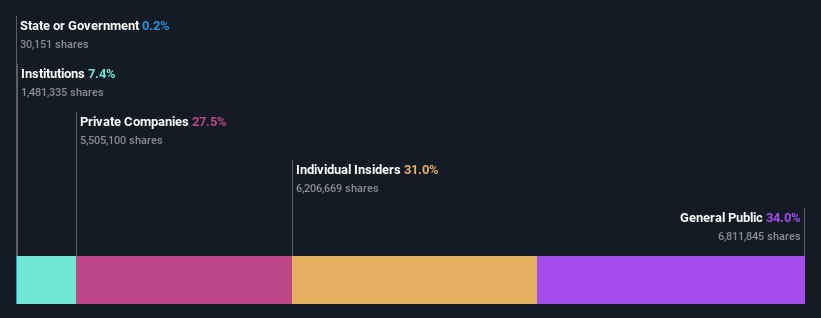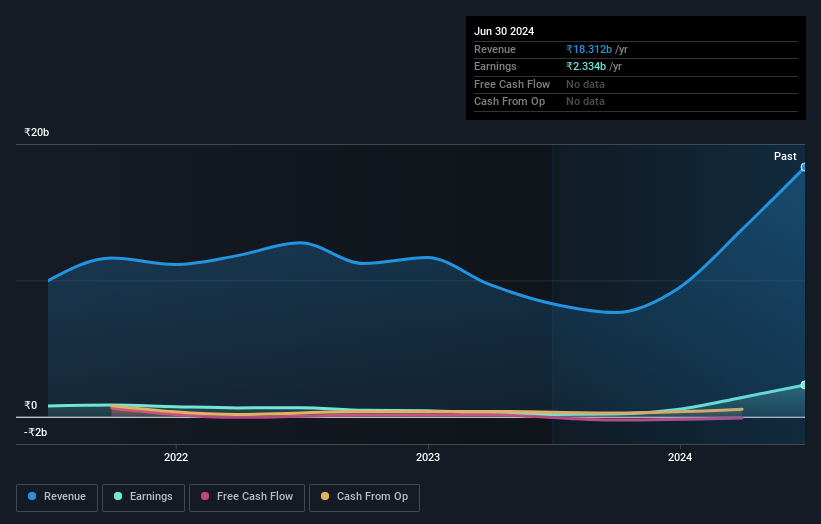Retail investors among Shakti Pumps (India) Limited's (NSE:SHAKTIPUMP) largest stockholders and were hit after last week's 4.8% price drop
Key Insights
- Shakti Pumps (India)'s significant retail investors ownership suggests that the key decisions are influenced by shareholders from the larger public
- A total of 8 investors have a majority stake in the company with 53% ownership
- 31% of Shakti Pumps (India) is held by insiders
Every investor in Shakti Pumps (India) Limited (NSE:SHAKTIPUMP) should be aware of the most powerful shareholder groups. The group holding the most number of shares in the company, around 34% to be precise, is retail investors. That is, the group stands to benefit the most if the stock rises (or lose the most if there is a downturn).
While the holdings of retail investors took a hit after last week’s 4.8% price drop, insiders with their 31% also suffered.
Let's delve deeper into each type of owner of Shakti Pumps (India), beginning with the chart below.
View our latest analysis for Shakti Pumps (India)

What Does The Institutional Ownership Tell Us About Shakti Pumps (India)?
Many institutions measure their performance against an index that approximates the local market. So they usually pay more attention to companies that are included in major indices.
Shakti Pumps (India) already has institutions on the share registry. Indeed, they own a respectable stake in the company. This implies the analysts working for those institutions have looked at the stock and they like it. But just like anyone else, they could be wrong. It is not uncommon to see a big share price drop if two large institutional investors try to sell out of a stock at the same time. So it is worth checking the past earnings trajectory of Shakti Pumps (India), (below). Of course, keep in mind that there are other factors to consider, too.

Shakti Pumps (India) is not owned by hedge funds. The company's largest shareholder is Shakti Sons Trust, with ownership of 19%. In comparison, the second and third largest shareholders hold about 7.8% and 7.5% of the stock. Sunil Patidar, who is the second-largest shareholder, also happens to hold the title of Senior Key Executive.
On further inspection, we found that more than half the company's shares are owned by the top 8 shareholders, suggesting that the interests of the larger shareholders are balanced out to an extent by the smaller ones.
While it makes sense to study institutional ownership data for a company, it also makes sense to study analyst sentiments to know which way the wind is blowing. We're not picking up on any analyst coverage of the stock at the moment, so the company is unlikely to be widely held.
Insider Ownership Of Shakti Pumps (India)
While the precise definition of an insider can be subjective, almost everyone considers board members to be insiders. The company management answer to the board and the latter should represent the interests of shareholders. Notably, sometimes top-level managers are on the board themselves.
I generally consider insider ownership to be a good thing. However, on some occasions it makes it more difficult for other shareholders to hold the board accountable for decisions.
Our most recent data indicates that insiders own a reasonable proportion of Shakti Pumps (India) Limited. It has a market capitalization of just ₹89b, and insiders have ₹28b worth of shares in their own names. That's quite significant. Most would be pleased to see the board is investing alongside them. You may wish to access this free chart showing recent trading by insiders.
General Public Ownership
With a 34% ownership, the general public, mostly comprising of individual investors, have some degree of sway over Shakti Pumps (India). While this group can't necessarily call the shots, it can certainly have a real influence on how the company is run.
Private Company Ownership
We can see that Private Companies own 27%, of the shares on issue. Private companies may be related parties. Sometimes insiders have an interest in a public company through a holding in a private company, rather than in their own capacity as an individual. While it's hard to draw any broad stroke conclusions, it is worth noting as an area for further research.
Next Steps:
While it is well worth considering the different groups that own a company, there are other factors that are even more important. Take risks for example - Shakti Pumps (India) has 2 warning signs we think you should be aware of.
Of course this may not be the best stock to buy. So take a peek at this free free list of interesting companies.
NB: Figures in this article are calculated using data from the last twelve months, which refer to the 12-month period ending on the last date of the month the financial statement is dated. This may not be consistent with full year annual report figures.
New: Manage All Your Stock Portfolios in One Place
We've created the ultimate portfolio companion for stock investors, and it's free.
• Connect an unlimited number of Portfolios and see your total in one currency
• Be alerted to new Warning Signs or Risks via email or mobile
• Track the Fair Value of your stocks
Have feedback on this article? Concerned about the content? Get in touch with us directly. Alternatively, email editorial-team (at) simplywallst.com.
This article by Simply Wall St is general in nature. We provide commentary based on historical data and analyst forecasts only using an unbiased methodology and our articles are not intended to be financial advice. It does not constitute a recommendation to buy or sell any stock, and does not take account of your objectives, or your financial situation. We aim to bring you long-term focused analysis driven by fundamental data. Note that our analysis may not factor in the latest price-sensitive company announcements or qualitative material. Simply Wall St has no position in any stocks mentioned.
About NSEI:SHAKTIPUMP
Shakti Pumps (India)
Engages in the manufacture, trade, and sale of pumps, motors, and their spare parts under the Shakti brand name in India and internationally.
Outstanding track record with excellent balance sheet.
Similar Companies
Market Insights
Community Narratives



